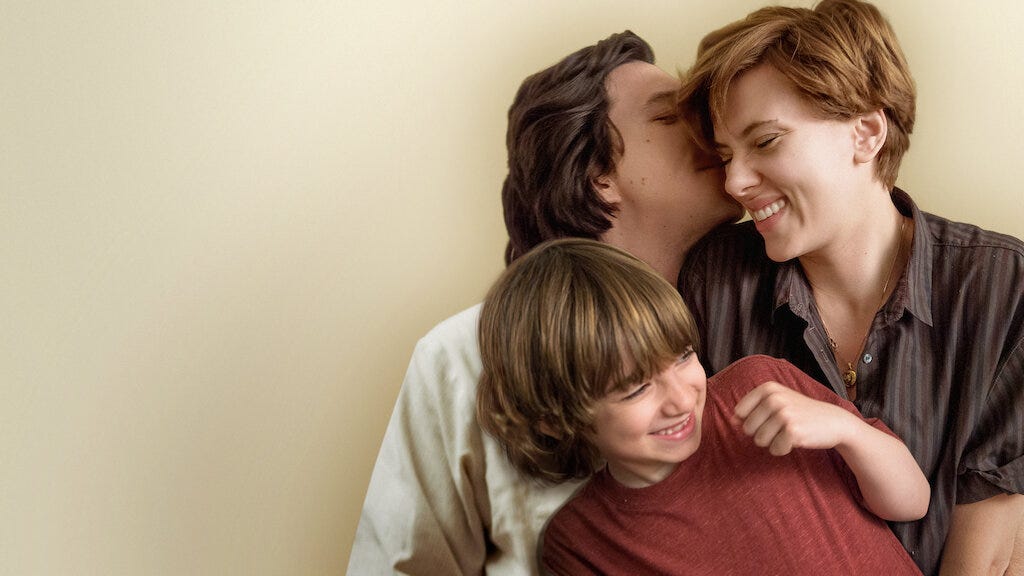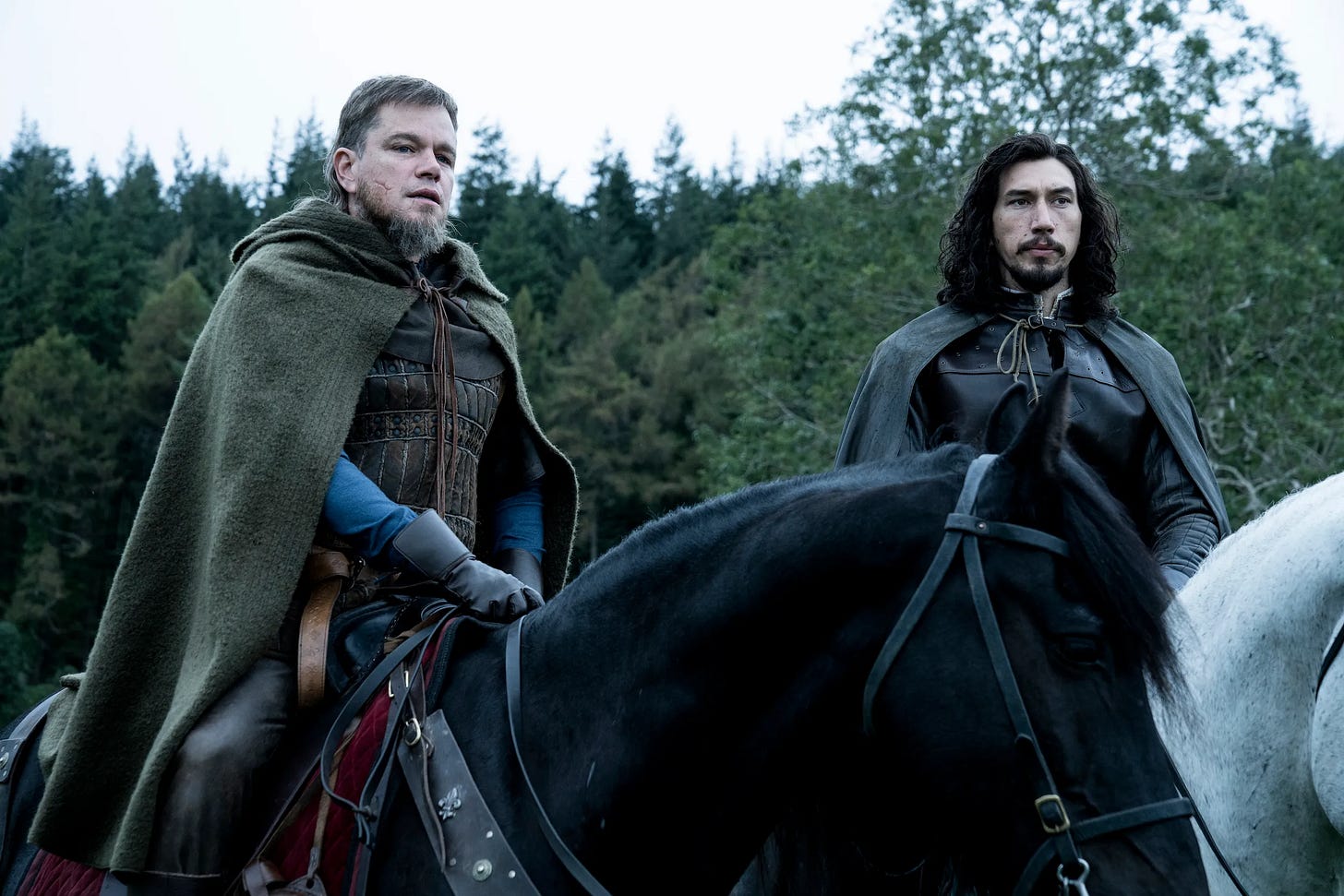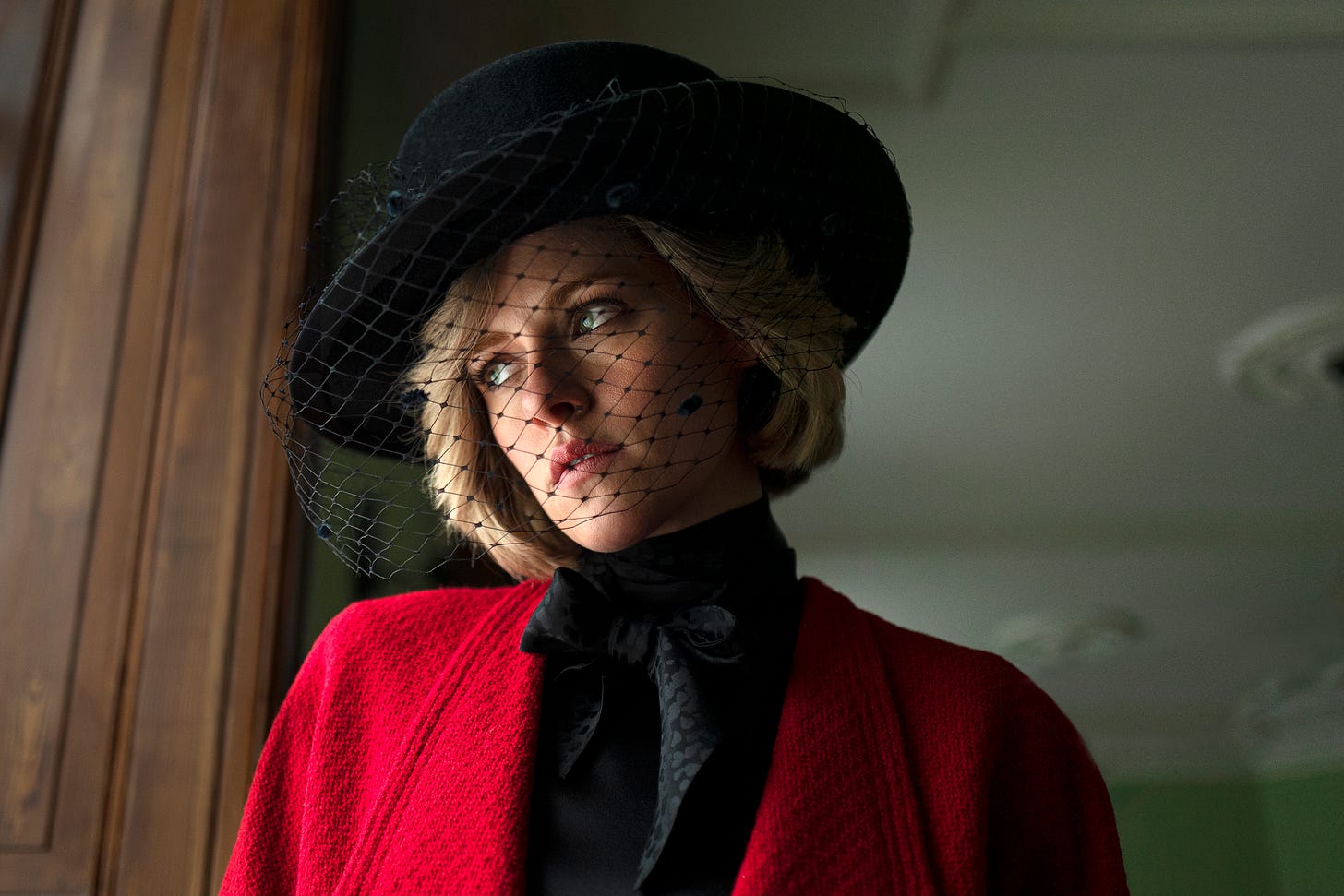Issue 7: From the Archives
Currently on marriages, royalty, and duels.
A note for this week: Each issue of Currentss takes 10-12 hours to write. I decided to take a break from writing during the holidays, so this week’s issue contains reviews from the archives.
📝 Reviewing: Marriage Story (2019)
I think about ‘Marriage Story’ every day. Like Charlie (Adam Driver), I eat as if I'm trying to get it over with, remember all the inside jokes, and cry easily in movies. On the other hand, Nicole (Scarlett Johansson) gives great presents, always admits when she doesn't know something, and makes me wish I could dance. Specifics like these make the characters feel realized, authentic, and relatable—characters we can trust.
Writer-director Noah Baumbach builds upon this foundation of trust by balancing moments of who is right or wrong, rational or irrational, winning or losing, all while never actually clarifying whose side we are supposed to be on. But choosing to side with one or the other is not what's important. Choosing to side with empathy is.
When we choose empathy, we learn about others, which provokes us to learn about ourselves. Once Charlie steps outside of his own emotions to see things from Nicole's perspective, he realizes that she hasn't felt valued, respected, or heard. Of course, these lessons come far too late for Charlie.
Like a relationship, ‘Marriage Story’ is flawed and complex, a blend of comedy and tragedy, war and peace, beauty and devastation. The film opens with a husband and wife sharing all the things they love about one another and ends with a husband and wife embracing their child. However, I don't believe it's a statement about marriage or divorce. I believe it's a statement about love.
I think about "Marriage Story" every day. It's a reminder to listen. It's a reminder to love. ‘Marriage Story’ is currently available to stream on Hulu.
📝 Reviewing: The Last Duel (2021)
‘Good Will Hunting’ is my favorite film of all time. Written in 1994 by Matt Damon and Ben Affleck, the film explores loneliness, loyalty, and friendship and won the Academy Award for Best Original Screenplay in 1998. When the writing duo announced their plans to collaborate on another script two decades after that Oscar win, it instantly became my most anticipated film.
This film, ‘The Last Duel,’ is based on Eric Jager’s nonfiction book, “The Last Duel: A True Story of Trial by Combat in Medieval France," which exhaustively describes the prosecution of sexual violence that led to the final judicial duel sanctioned by the Parlement of Paris.
Directed by Ridley Scott, the film adaptation dramatizes the historical events from the book with some fiercely choreographed battle scenes and the unique decision to structure the story into chapters told from three different perspectives—squire Jacques Le Gris (Adam Driver), knight Jean de Carrouges (Matt Damon), and Jean's wife Marguerite (Jodie Comer).
The choice to use a Rashomon plot device to depict the contradictory, monotonous, and graphic accounts of the same incident is where the film falters for me. I am confident that Damon and Affleck set out to tell a feminist story (they even brought on Nicole Holofcener to write the perspective of Marguerite) that comments on how systemic injustices of the past still linger today. However, the three-part structure means Marguerite only gets one-third of our attention. Because we spend so much time (over two hours of screen time) with the two men, we're left exhausted and uncomfortable when we finally get to her take on the situation.
Like ‘Good Will Hunting,’ ‘The Last Duel’ explores loneliness, loyalty, and friendship, but those aren't the most important themes of this story. For this story, I would have preferred the creators to have said, "I gotta go see about a girl," so we could have had a film that focused on a woman's pain instead of those that caused it. ‘The Last Duel’ is currently available to stream on Hulu.
📝 Reviewing: Spencer (2021)
"Elevated horror" films have been gaining popularity over the past decade. This highly debated term refers to psychological thrillers that scare the audience with relatable themes of anxiety, rage, trauma, and mental illness, instead of relying on conventional horror tropes such as violence, gore, and jump scares.
Horror has long played a vital role in society by examining the things that scare us the most. Elevated horror often utilizes metaphors and allegories to make points about the human experience, replacing physical demons with emotional ones like delusion, hallucination, and paranoia.
These films have captured attention with breathtaking scores, impressive production design, standout performances, stunning cinematography, shocking imagery, and clever marketing, gaining recognition from both the Academy and mainstream audiences.
However, elevated horror does have its shortcomings. The use of metaphors can feel pretentious, the commentary may lack subtlety, technical achievements can be over-stylized, and the slow burn, particularly in portraying women suffering through mental illness, self-destruction, and trauma, can be insufferable.
The most significant shortcoming of these minimalist art-horror films is that the tortured women depicted are gaslit for their grief, mocked for their mourning, and vilified for their violence, until they're overwhelmed by emotion and eventually find solace in food.
But enough about A24; let's talk about ‘Spencer.’ ‘Spencer’ is currently available to stream on Hulu.
Thanks for being here.
— Justin




